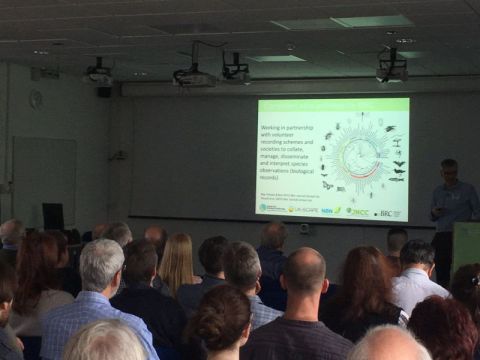Recording scheme news
Evidence from records
Biological records, including those collated by the national recording schemes, are one of the strands of evidence used to generate the UK government's 'biodiversity indicators'. The latest indicators were published by Defra in early September, and further information on how the indicators are generated can be found on the JNCC website. A wide range of partners contribute to these indicators, a number of which are based on a combination of analytical techniques from BRC/CEH using recording scheme data, such as that for the trend in distribution of priority species:
Another way in which recording scheme data is used to provide evidence is for the ongoing series of conservation status reviews. These reviews use internationally agreed criteria to assign species to their correct Red List category, and to produce lists of nationally rare and scarce species. Two new reviews were published by Natural England in 2019, one for longhorn beetles (Coleoptera: Cerambycidae) and one for a subfamily of rove beetles (Coleoptera: Staphylinidae: Tachyporinae). The full series of reviews can be found on the websites of JNCC, Natural England and Natural Resources Wales.
BRC recording schemes meeting and workshops
Last February BRC organised the latest in its series of recording scheme meetings, providing an opportunity for a wide range of recording scheme organisers to meet with representatives of government agencies and research organisations. The presentations and workshop reports are available to download. BRC is grateful to all who participated, and the workshop outputs are being used to steer the development of the relevant work programmes within BRC and CEH.
Beetle recording
Each year BRC works with the Oxford University Museum of Natural History and the British Entomological and Natural History Society to organise the Coleopterists' Day. This meeting is open to all with an interest in beetles, including recording, research and conservation. The next meeting will be on Saturday 8 February 2020 - look out for the full programme to be announced nearer the time (to get an idea of the range of topics covered see the 2019 programme).
BRC hosts the UK Beetle Recording website which provides links to all the beetle recording schemes. Several of these schemes produced updated identification guides during 2019, including revised versions of Mark Gurney's guide to soldier beetles and the Silphidae Recording Scheme's guide to burying beetles and allies; see also Mark's growing set of weevil identification guides.
FSC Biolinks project
Biolinks aims to encourage and support the study and recording of invertebrates, especially in the west midlands and south-east England. The project is run by FSC and funded by the National Lottery Heritage Fund. A number of national recording schemes are involved and there is a continuing series of training workshops focusing on developing invertebrate identification skills. There plenty of courses still to come in 2019, and you can sign up to receive information about next year's courses. Many of the records made on previous courses can be seen via iRecord.
The biolinks project is also supporting the use of new technologies for recording, including tools for mapping records in QGIS, and the development of online identification resources using the Identikit system. Find our more on the biolinks website, and you can now join a new forum to ask questions and share advice for using these tools.
News snippets
- The British Trust for Ornithology has published a data paper and full dataset describing the breeding and wintering bird distributions in Britain and Ireland, based on the records gathered for the series of national bird atlases published by BTO. A brilliant example of tens of thousands of volunteer recorders working together to advance our knowledge of species and environmental change.
- Keep up-to-date with news from the Botanical Society of Britain and Ireland via their monthly eNews - the latest (September) edition has updates on progress towards the next plant atlas, and new projects and events including plans for the New Year Plant Hunt 2020.
- Take part in "Walk This Water Way" for the Mammal Society, using their new Mammal Mapper app to focus on recording mammals along waterways. They are particularly interested in records of five key species – European Otter, American Mink, Water Vole, Eurasian Beaver and Brown Rat – but records of any mammal species you encounter are valuable!
- It is still Year of the Fly! Dipterists Forum continues to use this initiative to promote interest in recording flies. For instance, there have been a series of "fly of month" articles on the BBC Wildlife website, such as this one describing how soldierflies got their name.
- Presentations and reports are available to download from the 2019 National Forum for Biological Recording (NFBR) conference (including contributions from BRC staff Michael Pocock and Rich Burkmar).
- We are looking forward to the NBN Conference 2019, which takes place in Nottingham on 13 and 14 November, and includes the award presentations for winners of this year's biological recording awards (developed by the NBN Trust, NFBR and BRC to celebrate the achievements of individuals and groups in our sector).
- To keep up to date with national recording schemes via social media go to the BRC list of recording schemes on Twitter. Contact details for all national recording schemes are available here.
Finally, here is a sneak preview of images for an exciting new book that the Grasshopper Recording Scheme is working on with illustrator Richard Lewington:
This article was published in the BRC Newsletter September 2019
